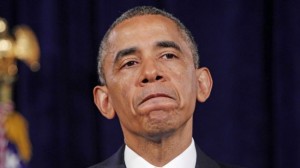 Iranian Diplomatic sources have suspected that Obamas yesterday statement about Iran has reduced the possibility of direct Tehran White House talks.
Iranian Diplomatic sources have suspected that Obamas yesterday statement about Iran has reduced the possibility of direct Tehran White House talks.In an interview with the ABC aired on Sunday, US President Barack Obama once again warned of a military attack on Iran, calling Tehrans nuclear program a top US concern.
This is while President Hassan Rouhani has repeatedly called on countries with tense relations with Iran since his election as Irans President to stop threatening the latter and step in the path of confidence-building for expansion of bilateral ties.
The US and its Western allies continue to accuse Iran of pursuing military objectives in its nuclear program despite the lack of any evidence suggesting that Tehrans atomic activities have a military angle and reports by the IAEA about the peaceful nature of the programs. The Supreme Leader of the Islamic Revolution Ayatollah Seyyed Ali Khamenei, the top political and religious figure in Iran, has issued a Fatwa forbidding the construction and use of nuclear weapons based on Islamic jurisprudence.
It is now years that Iran is trying to persuade five permanent members of the UN Security Council plus Germany that its nuclear programs is directed at peaceful purposes, but the US has imposed numerous paralyzing sanctions on Iran, saying they mistrust Tehran and has repeatedly threatened to strike Iran.
In his inaugural address, Rouhani downplayed US sanctions against Iran as useless to force Iran to give up its right to acquire nuclear technology, and insisted that dialogue, mutual confidence-building and reciprocal respect are the only ways to interact with Iran and reduce aggressions.
My suspicion is that the Iranians recognize they shouldnt draw a lesson that we havent struck [Syria] to think we wont strike Iran. On the other hand, what they should draw from this lesson is that there is the potential of resolving these issues diplomatically, said Obama in his ABC interview.
Earlier this week, Rouhani said his first step to resume nuclear talks will be taken in his visit from New York to attend the UN general assembly. The Iranian president will be accompanied with Foreign Minister Mohammad Javad Zarif, who is slated to meet with High Representative of the Union for Foreign Affairs for the European Union Catherine Ashton on September 23 to discuss ways to resume nuclear talks with the P5+1. Zarif will also attend a meeting with the British Foreign Minister, William Hague, at Londons request.
Some western sources have considered the possibility of Rouhanis direct meeting with American officials on the sidelines of the UN assembly. But Irans foreign minister of Wednesday stressed that the Islamic Republic of Iran has no plans for direct meetings with US officials in New York.
If US officials are ready to cooperate within the P5+1 with a diplomatic spirit, we would keep talks with the group, said Zarif.
Under the current administration of Iran, talks with the P5+1 should be pursued by the Foreign Ministry instead of the National Security Council of the country.
Diplomatic sources in Tehran have told Nasim that the Ministry of Foreign Affairs is preparing for various plans to talk with the P5+1, but is not to present any new plan in New York.
In New York the new custodians of nuclear talks from Iran want to see how the other side would act. Besides, Rouhani is very much interested in upgrading the level of negotiations in which foreign ministers of the countries will attend. How Iranian delegation views the circumstances of talks in US determines the future of negotiations,
By Nasim Online
The Iran Project is not responsible for the content of quoted articles.










